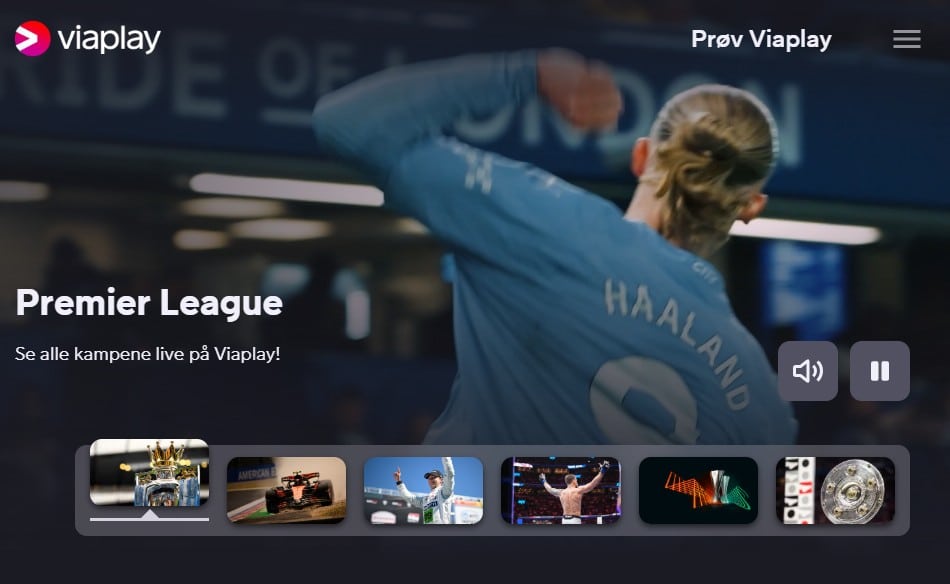 In recent years, rightsholders of major sports events have repeatedly complained that piracy of live sports has gone through the roof.
In recent years, rightsholders of major sports events have repeatedly complained that piracy of live sports has gone through the roof.
Many have called on politicians to tighten legislation and urged law enforcement to take the problem much more seriously.
The issues are no different in Norway, where streaming service Viaplay is facing a surge in piracy. According to a recent survey by Mediavision, 1.25 million Norwegians, or 30% of the population aged 15-74, use illegal streaming services every month.
IPTV piracy is particularly problematic. Research shows that 14% of all Norwegian households subscribe to an unauthorized IPTV service. That’s an increase of 40% compared to a year earlier.
These pirate platforms offer movies, regular TV programming, and access to live sports, including the popular English Premier League.
At What Cost?
These new statistics were the reason local news outlet Nettavisen ran a series of articles on IPTV piracy, which resulted in a mixed bag of commentary.
Rights holders, including Viaplay, see these rising piracy numbers as an existential threat that should be tackled sooner rather than later. Several politicians agree that this ‘illegal activity’ should not be condoned.
“We have an ongoing dialogue with the authorities about the challenges with illegal IPTV, and we notice that they see the seriousness of the problem and want to do something about it,” Viaplay’s Birgitte Malling said.
Jon Espen Nergård, chairman of the board of Nordic Content Protection, previously said that illegal market turnover was approaching one billion Norwegian kroner, with money going “into the pockets of criminals” instead of benefiting the Norwegian creative industries. He’s calling for tougher measures, stressing that “illegal use must have consequences.”
The notion that piracy is wrong was also reiterated by conservative politician Tage Pettersen, who, as a member of parliament, shows no sympathy for, or understanding of, people who turn to piracy. “It’s illegal,” he says.
Who is Paying The Price?
The legality of piracy is not really up for debate in the current discussions in Norway. However, many people, including politicians, academics, and experts, point out that the public revolt is likely a response to high costs.
A premium tier subscription to Viaplay with access to live sports currently costs 749 NOK (~$73) per month. That’s a steep increase compared to a few years ago, and one of the highest price points in Europe.
For comparison, a similar Viaplay subscription in the Netherlands costs less than a third of that, 235 NOK (~$23).

While many hardcore sports fans are willing to pay this price, there’s an increasing number of people who can’t or simply don’t want to pay so much. Instead, they opt for pirate IPTV services which also charge subscription fees, but at a fraction of the prices demanded by legitimate services.
‘Football Digs Its Own Grave’
Mimir Kristjansson, who’s currently a member of parliament for the Red Party, recognizes that piracy is against the law. However, he doesn’t feel particularly upset when people who choose that option.
Instead, he points a finger at the high subscription prices, which are a direct result of licensing fees charged by sports leagues, including the Premier League.
“Football digs its own grave when it costs so much money that ordinary people cannot have a Premier League season subscription, unless they are completely football crazy,” Kristjansson said.
Agnes Nærland Viljugrein of the Labor Party is not as outspoken but also mentions pricing as a key factor in this debate.
“As a politician, I would never encourage people to break the law, but I think it’s worth facing the realities. These are the steps people take, and it’s not unlikely to think that it’s about price,” Viljugrein said.
Illegal? So What?
While the authorities and rightsholders have repeatedly stressed that piracy is against the law, and may even be considered a criminal offense under some circumstances, Norwegians don’t seem to be fazed.
Harry Arne Solberg, professor at the Norwegian University of Science and Technology, says that this is in part because the risk of getting caught is low. In addition, he too sees price as a key factor.
“What we see time and again is that people are provoked by the prices. You don’t need to be a researcher to understand that, given the prices,” Solberg told Nettavisen.
“They probably know by definition that it’s illegal, but to put it in Northern Norwegian terms, they don’t give a damn,” he added.
The professor says that instead of hiding their illegal activity, Norwegians tell their friends about pirate IPTV services, helping them to save money too. That’s the polar opposite of what all anti-piracy efforts have tried to achieve.
All in all, it is clear that many Norwegians see IPTV piracy as a viable option to enjoy sports without paying too much, knowing very well that they are breaking the law. Turning this ship will require draconian enforcement actions or, alternatively, more affordable legal options.
From: TF, for the latest news on copyright battles, piracy and more.
Powered by WPeMatico
